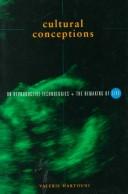| Listing 1 - 2 of 2 |
Sort by
|

ISBN: 0816626235 0816626227 Year: 1997 Publisher: Minneapolis University of Minnesota press
Abstract | Keywords | Export | Availability | Bookmark
 Loading...
Loading...Choose an application
- Reference Manager
- EndNote
- RefWorks (Direct export to RefWorks)
reproductieve technologie (voortplantingstechnologie, medisch begeleide voortplanting, MBV, artificiële voortplanting, kunstmatige voortplanting) --- technique de reproduction (technique de procréation, procréation médicalement assistée, PMA, procréation artificielle) --- Human reproductive technology --- Moral and ethical aspects --- Social aspects
Book
ISBN: 0814769764 0814738990 9780814771839 0814771831 9780814738993 9780814738498 0814738494 9780814769768 Year: 2012 Publisher: New York, NY
Abstract | Keywords | Export | Availability | Bookmark
 Loading...
Loading...Choose an application
- Reference Manager
- EndNote
- RefWorks (Direct export to RefWorks)
Visualizing Atrocity takes Hannah Arendt’s provocative and polarizing account of the 1961 trial of Nazi official Adolf Eichmann as its point of departure for reassessing some of the serviceable myths that have come to shape and limit our understanding both of the Nazi genocide and totalitarianism’s broader, constitutive, and recurrent features. These myths are inextricably tied to and reinforced viscerally by the atrocity imagery that emerged with the liberation of the concentration camps at the war’s end and played an especially important, evidentiary role in the postwar trials of perpetrators. At the 1945 Nuremberg Tribunal, particular practices of looking and seeing were first established with respect to these images that were later reinforced and institutionalized through Eichmann’s trial in Jerusalem as simply part of the fabric of historical fact. They have come to constitute a certain visual rhetoric that now circumscribes the moral and political fields and powerfully assists in contemporary mythmaking about how we know genocide and what is permitted to count as such. In contrast, Arendt’s claims about the “banality of evil” work to disrupt this visual rhetoric. More significantly still, they direct our attention well beyond the figure of Eichmann to a world organized now as then by practices and processes that while designed to sustain and even enhance life work as well to efface it.
Good and evil --- Genocide --- World War, 1939-1945 --- Holocaust, Jewish (1939-1945) --- War crime trials --- Catastrophe, Jewish (1939-1945) --- Destruction of the Jews (1939-1945) --- Extermination, Jewish (1939-1945) --- Holocaust, Nazi --- Ḥurban (1939-1945) --- Ḥurbn (1939-1945) --- Jewish Catastrophe (1939-1945) --- Jewish Holocaust (1939-1945) --- Jews --- Nazi Holocaust --- Nazi persecution of Jews --- Shoʾah (1939-1945) --- Kindertransports (Rescue operations) --- Trials (War crimes) --- Trials (Crimes against humanity) --- Trials (Genocide) --- Trials --- Cleansing, Ethnic --- Ethnic cleansing --- Ethnic purification --- Ethnocide --- Purification, Ethnic --- Crime --- Evil --- Wickedness --- Ethics --- Philosophy --- Polarity --- Religious thought --- Social aspects. --- Political aspects. --- History --- Atrocities --- Nazi persecution --- Persecutions --- Jewish resistance --- Eichmann, Adolf, --- Arendt, Hannah, --- Blücher, Hannah Arendt, --- Bluecher, Hannah Arendt, --- Ārento, Hanna, --- Arendt, H. --- Arendt, Khanna, --- ארנדט, חנה --- アーレント, ハンナ, --- Krumey, Richard, --- Clemente, Ricardo, --- Rudiger, Hans, --- Klementz, Richard, --- Klementz, Ricardo, --- Steinburg, Kurt, --- Eichmann, Karl Friedrich, --- Eichmann, Adolf Friedrich, --- Ajhman, Adolf, --- Klement, Rikardo, --- Eichmann, Karl Adolf, --- Aikhman, Adolf, --- Ėĭkhman, Adolʹf, --- Eichmann, Adolph, --- Eichmann, Otto Adolf, --- אייכמן, אדולף, --- אײכמאן, אדאָלף, --- Political and social views. --- Criticism and interpretation. --- Holocaust, Nazi (Jewish Holocaust) --- Nazi Holocaust (Jewish Holocaust) --- Nazi persecution (1939-1945)
| Listing 1 - 2 of 2 |
Sort by
|

 Search
Search Feedback
Feedback About UniCat
About UniCat  Help
Help News
News